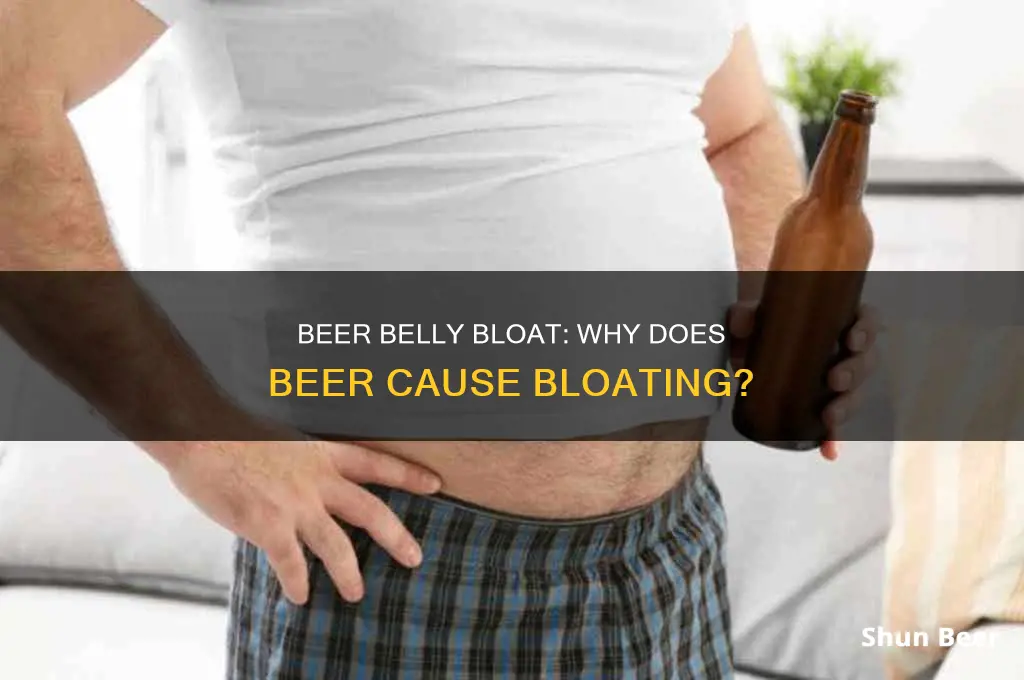
Alcohol bloating is a common side effect of drinking alcohol. It occurs when the body retains excess water due to the dehydrating effects of alcohol, which causes a swollen or puffy appearance in the face, stomach, or limbs. The primary cause of alcohol bloating is dehydration, as alcohol is a diuretic, increasing urine production and causing the body to lose water. This loss of fluids can lead to dehydration, causing the body to retain water and resulting in swelling. In addition to dehydration, drinking alcohol can irritate the digestive system, causing inflammation in the stomach and intestines, leading to gas, bloating, and discomfort. Beer, in particular, can cause bloating due to its carbonation, high carbohydrate content, and the gas produced during the fermentation process.
| Characteristics | Values |
|---|---|
| Alcohol type | Beer, wine, cider, whiskey, champagne, prosecco |
| Calories | One drink can contain several hundred calories |
| Diuretic | Yes |
| Dehydration | Yes |
| Gas production | Yes |
| Inflammation | Yes |
| Swelling | Yes |
| Stomach irritation | Yes |
| Digestive issues | Yes |
| Weight gain | Yes |
| High sugar content | Yes |
| High gluten levels | Yes |
What You'll Learn
- Beer is carbonated and high in carbohydrates, which can cause bloating
- Alcohol causes dehydration, making the body retain water and swell
- Alcohol mixers are often high in sugar and carbon dioxide, leading to bloating
- Alcohol increases acid production in the stomach, causing inflammation and irritation
- Alcohol can cause weight gain, which may feel like bloating

Beer is carbonated and high in carbohydrates, which can cause bloating
Beer is a well-known culprit for causing bloating, and this is largely due to its carbonation and high carbohydrate content. Carbonation refers to the presence of dissolved carbon dioxide in beer, which is released as bubbles when the bottle or can is opened. This excess gas can build up in the digestive system, leading to bloating and discomfort.
The fermentation process in beer also produces gas in the digestive system, which can further contribute to feelings of fullness and bloating. Additionally, beer is high in carbohydrates, which are sugars that provide energy to the body. These carbohydrates are not easily digested and can also feed the bacteria in the gut, leading to increased gas production and bloating.
The high carbohydrate content of beer can also contribute to weight gain, which may be mistaken for bloating. Beer is high in calories, with a regular beer containing around 150 calories per 12 fluid ounces. This can lead to an increased size of the abdomen, often referred to as a "beer belly."
Furthermore, beer can irritate the digestive system and cause inflammation in the stomach and intestines. This inflammation can lead to gas, bloating, and discomfort, especially for those who consume large amounts of beer or have underlying digestive conditions such as irritable bowel syndrome (IBS).
To reduce beer-related bloating, it is recommended to drink in moderation and stay hydrated by consuming plenty of water. Eating a balanced meal before drinking can also help slow down the absorption of alcohol and reduce the risk of bloating and other digestive issues.
Beer and Colonoscopy: What's the Safe Timeline?
You may want to see also

Alcohol causes dehydration, making the body retain water and swell
Alcohol is a diuretic, which means it increases urine production and causes the body to lose water. This loss of fluids can lead to dehydration, which in turn causes the body to retain water in an attempt to rehydrate itself. This can result in swelling or puffiness in various parts of the body.
When the body is dehydrated, the stomach pulls any possible water from other tissues and stores it in the gut, leading to an incredibly bloated and puffy sensation. This can be exacerbated by drinking alcoholic beverages with other fluids, such as carbonated sodas and sugary fruit juices.
The dehydration caused by alcohol consumption can also slow down digestion, causing food to sit in the digestive tract for longer, which can further contribute to bloating. In addition, alcohol can irritate the digestive system and cause inflammation in the stomach and intestines, leading to gas, discomfort, and abdominal pain.
To counteract the dehydrating effects of alcohol and prevent fluid retention, it is important to stay hydrated by drinking plenty of water before, during, and after consuming alcohol.
Tooth Extraction: Beer Drinking Timeline and Safety Tips
You may want to see also

Alcohol mixers are often high in sugar and carbon dioxide, leading to bloating
Alcohol mixers are often high in sugar and carbon dioxide, which can lead to bloating. This is because the sugar and carbonation create gas in the gut, which can cause discomfort and a puffy appearance. Alcohol is also a diuretic, meaning it increases urine production and causes the body to lose water, leading to dehydration. When the body is dehydrated, the stomach pulls water from other tissues and stores it in the gut, which can result in a bloated and puffy sensation.
Additionally, alcohol can irritate the digestive system and cause inflammation in the stomach and intestines. This irritation can be worsened by the high sugar and carbon dioxide content of mixers, leading to further bloating. Alcohol also causes the stomach to empty more frequently, which can create irritation in the intestinal tract and lead to inflammation and pain in the abdomen.
The combination of alcohol and sugary, carbonated mixers can therefore lead to increased gas production and bloating. This can be exacerbated by consuming large amounts of alcohol or having an underlying digestive condition such as irritable bowel syndrome (IBS).
To reduce alcohol bloating, it is recommended to choose non-fizzy mixers with your drinks and avoid sugary ingredients. Drinking plenty of water before, during, and after consuming alcohol can also help to counteract dehydration and prevent fluid retention.
Drinking Non-Alcoholic Beers: How Many Is Too Many?
You may want to see also

Alcohol increases acid production in the stomach, causing inflammation and irritation
Alcohol consumption can cause bloating by increasing acid production in the stomach, which can lead to inflammation and irritation. This is due to the high number of calories in alcoholic drinks, which can result in weight gain and a swollen appearance. Alcohol is also an inflammatory substance that can irritate the digestive system and cause swelling in the body. Additionally, the fermentation process in beer can produce gas in the digestive system, leading to bloating and discomfort.
Alcoholic beverages with low ethanol content, such as beer and wine, are strong stimulants of gastric acid secretion. Pure ethanol in low concentrations (5% vol/vol) is a mild stimulant of acid secretion, while at higher concentrations, it has no effect or a mildly inhibitory effect. The powerful stimulants of gastric acid secretion in beer are yet to be identified, but they are believed to be thermostable and anionic polar substances.
The increased acid production caused by alcohol consumption can lead to inflammation and irritation of the stomach lining, a condition known as acute gastritis. If left untreated, acute gastritis can develop into chronic gastritis, where persistently high levels of stomach acid cause stomach ulcers. Alcohol can also contribute to gastroesophageal reflux disease (GERD) by causing inflammation of the stomach lining and impairing the function of the lower esophageal sphincter (LES).
To prevent alcohol-induced bloating, it is important to moderate alcohol consumption and stay hydrated by drinking plenty of water. Eating a balanced meal before drinking can also help slow down alcohol absorption and reduce the risk of bloating. If you experience alcohol bloating, drinking water, eating a light meal, and taking over-the-counter medications like antacids can help alleviate symptoms.
Beer and Health: One Drink, No Harm?
You may want to see also

Alcohol can cause weight gain, which may feel like bloating
Alcoholic drinks are typically high in calories. Beer, for example, contains 153 calories per 12 fluid ounces, while a glass of wine (5 fluid ounces) contains 125 calories. A single serving of distilled liquor (1.5 fluid ounces) contains 90-100 calories. If you're drinking several of these in one night, that's several hundred calories, which can lead to weight gain.
This weight gain can increase the size of the abdomen and give the appearance of bloating. It's different from bloating, but it can feel like it.
Alcohol is a diuretic, which means it increases urine production and causes the body to lose water. This dehydration can lead to the body retaining water, causing swelling or puffiness in the face, stomach, or limbs. This is the body's attempt to rehydrate itself.
Drinking a smaller amount of alcohol can prevent weight gain and the appearance of bloating. Staying hydrated by drinking water before, during, and after drinking alcohol can also help to prevent fluid retention.
Beer and TB Treatment: Is It Safe?
You may want to see also
Frequently asked questions
Beer is carbonated and has a high carbohydrate content. The fermentation process in beer can produce gas in the digestive system, leading to bloating and discomfort.
Alcohol is a diuretic, which means it increases urine production and causes dehydration. This causes the body to retain water, resulting in swelling and a puffy appearance. Alcohol can also irritate the stomach lining and the digestive tract, causing inflammation and pain in the abdomen.
Alcohol bloating can lead to mild abdominal pain or more severe issues such as inflammation of the liver and intestine, leaky gut syndrome, and an increased risk of cardiovascular diseases. If left unchecked, it can also result in chronic gastritis, inflammatory bowel disease, and other serious health conditions.
Reducing alcohol consumption is the most effective way to prevent and reduce bloating. Staying hydrated by drinking water before, during, and after consuming alcohol can also help counteract dehydration and prevent fluid retention. Eating a balanced meal before drinking can slow down alcohol absorption and reduce the risk of bloating and other digestive issues.







